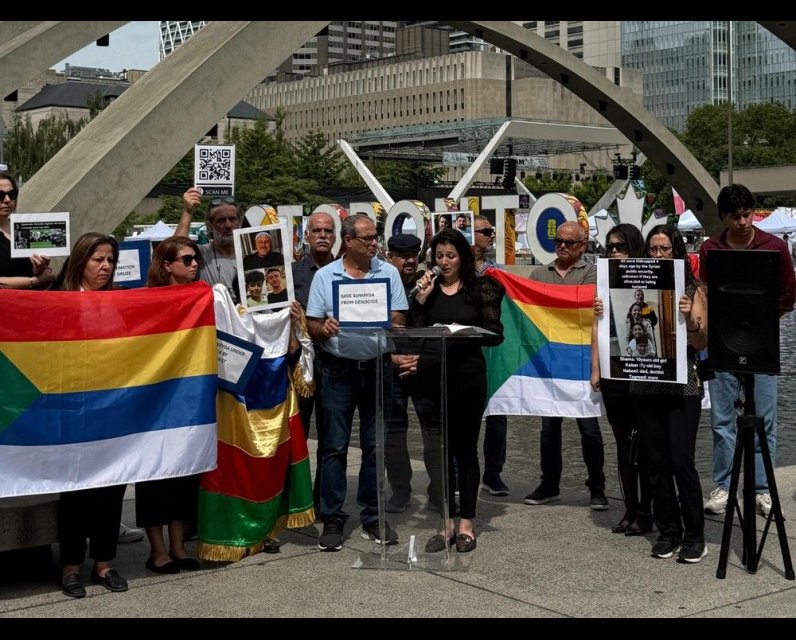Source Feed: National Post
Author: Special to National Post
Publication Date: August 5, 2025 - 11:02
'They were shot in the head': Canadian Druze ask Ottawa to intervene
August 5, 2025

Members of the Druze diaspora in Canada are facing anguish and uncertainty as they await word from family and friends in Syria amid reports of massacres and kidnappings. The largely Druze town of Suwayda was shaken in mid-July by clashes between Druze and armed Bedouin. Reuters reports execution-style killings of unarmed Druze civilians and home-to-home massacres, with about a thousand believed killed in the bloodshed. A medical examiner said he had seen about 500 bodies, including a decapitation, close-range gunshots, and teenage girls with throats slit. The government of President Ahmed al-Sharaa, who overthrew the Assad regime last December, has denied any involvement in the civilian killings. Canadian Druze held a news conference on July 25 outside Toronto City Hall to call the public’s attention to the atrocities and to call on the Canadian government to intervene. Among them: Rahaf Alakbani, 34, who arrived from Suwayda with her husband, Esmaeel Aboufakher, in February 2016, following the escalation of violence and persecution in Syria.
She still has family members in Suwayda, including her parents and siblings. Her two nephews – Salah, 13 and Yusuf, 15 – and brother-in-law Samir, were killed, and her friend’s brother is still missing. With electricity and internet cut, she’s unable to determine their safety or whereabouts. Alakbani has worked with the Canadian Centre for Victims of Torture, supporting refugees and survivors of trauma as they adapt to life in Canada. She spoke to Dave Gordon for National Post. What was it like for you when the Assad regime fell? We always dreamed the regime would be done, and it was so amazing, and we felt optimistic for a new future. We wanted to rebuild Syria. My husband and I work in the humanitarian field, and social work, and we had lots of ideas to build our countries. But the new regime ruined all these dreams. When you heard of the atrocities this month, what went through your mind? I still cannot believe it. I could barely sleep. I could barely talk. My parents are still there, my husband’s family with eight sisters. We’re worried about them.
What kind of contact have you had with friends and family in Syria? Before the internet cut off, I was talking to them through WhatsApp. But they cut the internet and the landlines and electricity. I don’t know whether they are still alive. How did you find out about what happened to your brother-in-law and his boys? When there was internet. My sister-in-law has three boys, one of them, he lives in Jordan. He’s studying there. And so he sent us on the WhatsApp group that his brothers and his dad were killed. They were shot in the back and the head. My sister-in-law, my husband’s sister Hanna, had a camera in the home, and had everything documented, but she doesn’t know how to release this, so we’re trying to help her to have this as evidence. Tell me about Salah and Yusuf, your nephews. I remember when we went to Syria (six years ago), they were both learning instruments. We sat together, we started singing, playing music. They’re very talented. They were very beautiful spirits. They were full of life, and very funny. So they have nothing to do with any politics, any war.
What do you remember about Samir?
He used to have a detergent factory and always liked to help people. My mom-in-law always said when sometimes people came to buy some detergent, and he knew that they are poor, he didn’t take money from them. He was very funny, wise.
What are your connections in Syria hearing and seeing? My sister-in-law lives in the city centre; all of the militias were attacking the neighborhood, and was very horrible situation for them. It was tragedy. They heard gunfire, rockets and the fighters were shouting, ‘Allahu Akbar,’ and they were just running. And my sister-in-law saw all this from her door, and saw a civilian knifed in the head. I have a friend who told me her entire town was gone. But the city has many villages or towns, so basically, more than 200 towns have been invaded and attacked. Families were massacred inside their homes. And friends, elderly, even people with special needs, executed. People in wheelchairs. I saw videos from friends and family, and I couldn’t believe it. These aren’t humans. Do you think this was entirely coordinated? It’s absolutely being coordinated. What do you want the Canadian government to know, or do, about what’s going on? I wanted the Canadian government to know that people are still suffering. There’s different kinds of violence by those militias that are loyal to Ahmed al-Sharaa. I want the Canadian government to condemn the violence and ethnic cleansing. The people are under siege. There’s no electricity, no access to clean water, no fuel. I want governments, international bodies and any humanitarian organizations, to step up, and save our people. They need safe passage for food and medical aid. The only road to deliver has been closed. We need humanitarian corridors. People are dying from starvation, from thirst, from hunger. Pressure the regime. This interview has been edited for brevity.
The game-tying solo shot stung. The go-ahead homer was a body blow.
August 26, 2025 - 23:48 | Globalnews Digital | Global News - Ottawa
The Minnesota Twins hit two homers off Toronto closer Jeff Hoffman in the ninth inning of a 7-5 comeback victory over the Blue Jays on Tuesday at Rogers Centre.
August 26, 2025 - 22:31 | Globalnews Digital | Global News - Ottawa
The majority of Edmonton city council approved the $400 million master agreement plan after contentious deliberations on Monday. The vote came down 9 to 4.
August 26, 2025 - 21:37 | Kabi Moulitharan | Global News - Canada




Comments
Be the first to comment